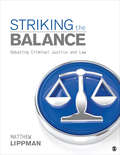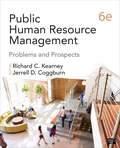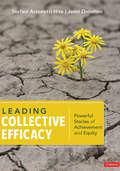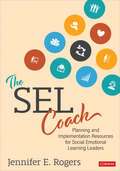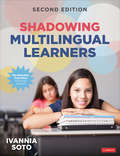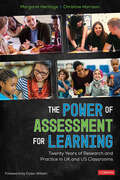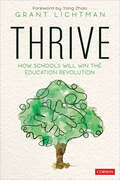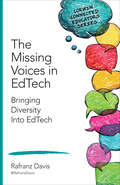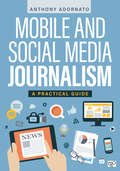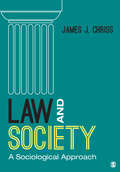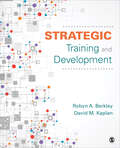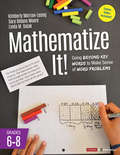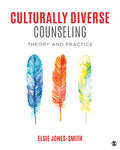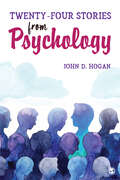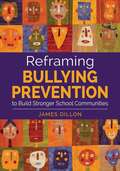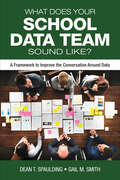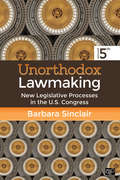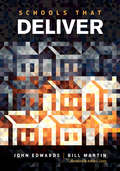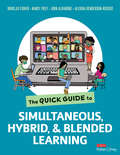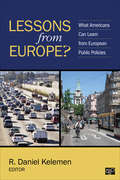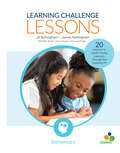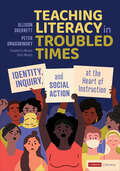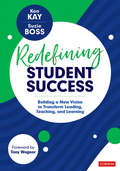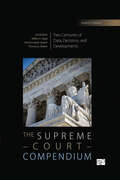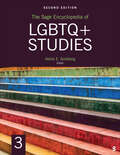- Table View
- List View
Striking the Balance: Debating Criminal Justice and Law
by Matthew LippmanAward-winning professor and author Matthew Lippman enhances teaching and learning with his newest text, Striking the Balance: Debating Criminal Justice and Law. Organizing the book around clashing points of view on contemporary issues in criminal justice and criminal law, Lippman puts each debate into context for students to help them develop a better understanding of the issue. Designed to develop the reader’s critical thinking skills, the text offers students summaries of contrasting views from original sources, questions for classroom discussion, and engaging "You Decide" activities. Additionally, chapter topics are independent of one another, giving instructors the flexibility to customize the material to their individual course organization. Edited to minimize technical legal terms, the text is the perfect companion to any criminal law or introductory criminal justice textbook.
Public Human Resource Management: Problems and Prospects
by Richard C. Kearney Jerrell D. CoggburnPublic Human Resource Management: Problems and Prospects brings together exemplary contributors who provide concise essays on major contemporary public human resources management issues. Organized into four parts – setting, techniques, issues and prospects – and covering the major process, function and policy issues in the field, the text offers valuable wisdom to students and practitioners alike. With sixteen new and eleven updated chapters authored by the leading figures in the field as well as by up-and-coming new scholars, the new edition works as a primary or supplementary text for courses in human resource management or issues in public administration.
Leading Collective Efficacy: Powerful Stories of Achievement and Equity
by Jenni Anne Donohoo Stefani Arzonetti HiteInspiration and Guidance to Develop Collective Teacher Efficacy Collective efficacy, or a shared belief that through collective action educators can positively influence student outcomes, has remained at the top of a list of influences on student achievement in John Hattie’s Visible Learning research. Collective efficacy has been embodied by many educators, though collaboration tends to be focused on building community and relationships, which alone are not enough to move the needle on student achievement. This book contains stories of collective efficacy in schools where it has been actualized in practice, and includes: • Real-world case studies of teams who have fostered and sustained collective efficacy • Practical guidance for building collective efficacy through professional learning designs • Tools that can be adapted for specific needs or local contexts Through these accounts, readers will gain a better understanding of ways to capitalize on the reciprocal relationship between student achievement and collective efficacy by having a clear understanding of what collective efficacy looks like and how it can be accomplished.
The SEL Coach: Planning and Implementation Resources for Social Emotional Learning Leaders
by Jennifer E RogersYour guide to transforming SEL ideas into actions and practice into process While social-emotional learning (SEL) is regularly identified as a top priority for student well-being and achievement, effective implementation will not happen on its own. That’s what makes the SEL coach critical to success. Effective systems change happens with an SEL coach who has the skills to lead, communicate, analyze, train, collaborate, and innovate. Whether you are brand new to the position or have been an SEL coach for some time, this book will provide you with all the resources and ideas you need to take implementation to the next level. Jennifer Rogers shares the secrets to enriching your coaching skillset, including Data Collection—strategic monitoring of the implementation progress Training—engaging staff in learning and advocating for their needs Communication—listening actively, modeling, and summarizing Team-Leading—creating an environment that is supportive and goal-focused The lessons and examples in this book produce coaching competencies and qualities necessary to transform practices into processes, ideas into action plans, and goals into outcomes. Learn how to be a successful SEL implementor with this strategy-packed guidebook!
Shadowing Multilingual Learners
by Ivannia SotoWalk in your Students’ Shoes with Multilingual Learner Shadowing The need for powerful professional learning to enable Multilingual Learners reach their full potential is more profound than ever. MLL shadowing is a way to create urgency around the instructional and academic needs of Multilingual Learners. The MLL Shadowing protocol is used to collect data on MLL’s opportunities for speaking and listening--the building blocks for reading and writing--in our classrooms. Updated after 10 years of research and practice, the second edition of this bestselling resource includes an overview on the importance of oral language development, information on preparing the shadowing experience, the complete shadowing protocol, a guide for analyzing the shadowing experience and key oral language development strategies. The new edition also adds improved data collection for oral language expression, as well as highlights updated research and classroom practice concerning new policies and programs implemented across the country. A comprehensive guide to ELL shadowing is presented alongside: Detailed case studies showing real-world examples Guidelines for analyzing and reflecting on the shadowing experience Guidelines for shadowing in a virtual environment Guidelines for shadowing in a multilingual environment An assets-based orientation to student learning and the use of achievement data to improve ELL education This book provides an entry point for broader, systemic improvement that will serve ELLs in more varied instructional settings, including monolingual and bilingual programs.
The Power of Assessment for Learning: Twenty Years of Research and Practice in UK and US Classrooms
by Margaret Heritage Christine Ann HarrisonThe future of Assessment for Learning 20 years after Inside the Black Box Twenty years after the publication of Inside the Black Box, the landmark review of formative classroom assessment, international education experts Christine Harrison and Margaret Heritage tackle assessment for learning (AfL) anew, with fresh insights gained from two decades of research, theory, and classroom practice. The Power of Assessment for Learning: Twenty Years of Research and Practice in UK & US Classrooms examines the practices and processes of formative assessment over time in both countries, evaluates the benefits accrued to teaching and learning, and considers future developments in growing and sustaining AfL practice. It features: Key AfL ideas, approaches, and supports Vignettes of classroom practice that illustrate AfL in action in the U.K. and U.S. Practice-based evidence to enrich understanding of AfL from both the teacher’s and the student’s perspective Focused on student-centeredness and rich with classroom examples, this book is a ‘sounding board’ for educators to explore and reflect on their own AfL practices and beliefs.
Thrive: How Schools Will Win the Education Revolution
by Grant LichtmanBecome an irresistible school Our rapidly evolving world is dramatically impacting how we view schools. Fortunately, we have the knowledge to not only survive, but thrive during rapid change. Other organizations have faced these evolutionary disruptions for centuries. Thrive: How Schools Will Win the Education Revolution translates this knowledge for educators. Written by Grant Lichtman, a thought leader on the transformation of education, this book will help administrators understand: • The most important concepts in creating long-term success: value, strategy, and innovation • The Five Big Tools of strategic change, to build both a comfort and capacity for change • The reality of competing in an evolving marketplace Families are choosing from a growing menu of learning options. Your school needs a value proposition that shouts, "We are your best choice!" As an educator, you have an important role to play in winning the education revolution and making your school irresistible to your community.
The Missing Voices in EdTech: Bringing Diversity Into EdTech (Corwin Connected Educators Series)
by Rafranz DavisMaking tech decisions from a diverse space starts here! This book offers leaders and teachers a reflective journey into diverse perspectives on technology as it is used and understood in our schools. Through step-by-step strategies and powerful vignettes, Rafranz Davis explores the deep impact inclusive EdTech conversations can have for teachers, students, women, and people of color. Educators learn practical, step-by-step solutions to: Engage students and give them a voice Cultivate diverse teacher feedback Encourage EdTech leadership for women and people of color Includes real-life stories from educators. Transform the EdTech landscape and create lasting change with this one-of-a-kind book! The Corwin Connected Educators series is your key to unlocking the greatest resource available to all educators: other educators. Being a Connected Educator is more than a set of actions: it’s a belief in the potential of technology to fuel lifelong learning. "Davis’s book is both a guide for administrators and edtech leaders seeking to better support student and teacher voices and an important testimony to the power of voices willing to raise the tough questions." —Carolyn Foote, Digital Librarian Westlake High School, Austin, Texas "Davis powerfully addresses the human side of technology integration. She moves teachers and school leadership with her passion, while offering real solutions to the issues that arise when integrating technology. Her solutions and ideas focus on improving the discourse between teachers, students, and leadership so that they all work collaboratively in enhancing the learning environment. She also addresses ways we can encourage women and minorities to take leadership roles in the field of education technology." —Shelly Sanchez Terrell Author/Founder of The 30 Goals Challenge for Teachers
Mobile and Social Media Journalism: A Practical Guide
by Anthony C. AdornatoBook Winner of the 2017-2018 Park Writing Award A Practical Guide for Multimedia Journalism Mobile and Social Media Journalism is the go-to guide for understanding how today’s journalists and news organizations use mobile and social media to gather news, distribute content, and create audience engagement. Checklists and practical activities in every chapter enable readers to immediately build the mobile and social media skills that today’s journalists need and news organizations expect. In addition to providing the fundamentals of mobile and social media journalism, award-winning communications professional and author Anthony Adornato discusses how mobile devices and social media have changed the way our audiences consume news and what that means for journalists. The book addresses a changing media landscape by emphasizing the application of the core values of journalism—such as authentication, verification, and credibility—to emerging media tools and strategies.
Law and Society: A Sociological Approach
by James J. ChrissThis text introduces students to the study of law from a sociological perspective by focusing on four themes: the relationship between law and society; law in everyday life; the role of race, class and gender in the legal system; and current political debates that are connected to law. While explaining the essentials elements of law, and drawing on scholarly literature and relevant cases, the author does not advocate for normative views on law and the legal system. The text compares laws across various societies, discusses international law, and demonstrates how the laws of certain countries affect those of others--providing readers with insights into the nature of law within any society.
Strategic Training and Development
by David M. Kaplan Robyn Ann BerkleyPeople are the most important resource for today′s organizations. Organizations must invest in their employees to sustain a competitive advantage and achieve their strategic objectives. Strategic Training and Development translates theory and research into best practices for improving employee knowledge, skills, and behaviors in the workplace. Authors Robyn A. Berkley and David M. Kaplan take a holistic and experiential approach, providing ample practice opportunities for students. A strong focus on technology, ethics, legal issues, diversity and inclusion, and succession helps prepare students to succeed in today’s business environment.
Mathematize It! [Grades 6-8]: Going Beyond Key Words to Make Sense of Word Problems, Grades 6-8 (Corwin Mathematics Series)
by Linda M. Gojak Sara Delano Moore Kimberly Morrow-LeongHelp students reveal the math behind the words "I don’t get what I’m supposed to do!" This is a common refrain from students when asked to solve word problems. Solving problems is about more than computation. Students must understand the mathematics of a situation to know what computation will lead to an appropriate solution. Many students often pluck numbers from the problem and plug them into an equation using the first operation they can think of (or the last one they practiced). Students also tend to choose an operation by solely relying on key words that they believe will help them arrive at an answer, without careful consideration of what the problem is actually asking of them. Mathematize It! Going Beyond Key Words to Make Sense of Word Problems, Grades 6–8 shares a reasoning approach that helps students dig into the problem to uncover the underlying mathematics, deeply consider the problem’s context, and employ strong operation sense to solve it. Through the process of mathematizing, the authors provide an explanation of a consistent method—and specific instructional strategies—to take the initial focus off specific numbers and computations and put it on the actions and relationships expressed in the problem. Sure to enhance teachers’ own operation sense, this user-friendly resource for Grades 6–8: · Offers a systematic mathematizing process for students to use when solving word problems · Gives practice opportunities and dozens of problems to leverage in the classroom · Provides specific examples of questions and explorations for multiplication and division, fractions and decimals, as well as operations with rational numbers · Demonstrates the use of visual representations to model problems with dozens of short videos · Includes end-of-chapter activities and reflection questions How can you help your students understand what is happening mathematically when solving word problems? Mathematize it!
Culturally Diverse Counseling: Theory and Practice
by Elsie Jones-SmithCulturally Diverse Counseling: Theory and Practice adopts a unique strengths-based approach in teaching students to focus on the positive attributes of individual clients and incorporate those strengths, along with other essential cultural considerations, into their diagnosis and treatment. With an emphasis on strengths as recommended in the 2017 multicultural guidelines set forth by the American Psychological Association (APA), this comprehensive text includes considerations for clinical practice with twelve groups, including older adults, immigrants and refugees, clients with disabilities, and multiracial clients. Each chapter includes practical guidelines for counselors, including opportunities for students to identify and curb their own implicit and explicit biases. A final chapter on social class, social justice, intersectionality, and privilege reminds readers of the various factors they must consider when working with clients of all backgrounds.
Twenty-Four Stories From Psychology
by John D. HoganA good story sets the stage for engaged learning. Nowhere is this more important than in foundational courses, such as Introductory or History of Psychology. By weaving foundational and modern characters across a historical landscape, John Hogan’s Twenty-Four Stories from Psychology captivates readers with the rich stories- the who, what, where, why and how- for many of the major theories and colorful characters who have shaped the development of Psychology as a field.
Reframing Bullying Prevention to Build Stronger School Communities
by James E. DillonTackle underlying issues to get to the root of bullying By reframing bullying prevention, you can make significant progress in addressing the underlying issues causing bullying and aggression in your school. In this resource, James Dillon digs into the work that busy educators often have little time for: translating rich and insightful research on the dynamics of change into practical terms. He probes deeply into the issues and why they persist in our schools to promote meaningful conversation among school staff and parents. Inside you’ll find Vignettes, analogies, and real-life examples along with tools that illustrate the benefits of using alternative methods to prevent bullying Discussion on transforming the role of discipline to reframe bullying among teachers, administrators, and students Key ideas and concepts summarized in easy-to-understand bullet points and charts Guidance on how to establish a school climate that promotes empathy and compassion instead of fear Reframing bullying prevention will allow competent and caring educators, students, and parents to not just stop bullying, but to improve the learning environment for all students. "With bullying in our schools intensifying and becoming a dangerous detriment to both the learning process and to the self-esteem of our students, James Dillon provides sound strategies and realistic conversations that must become integral to the reduction and prevention of bullying in the schools." —Lori L. Grossman, Educational Consultant Houston, TX "While this book focuses on bullying prevention, the reframing process will change much more! Following the author’s ideas has the potential to dramatically and positively reframe a school culture to match the needs of the 21st century learners and educators." — Scott A. Miller, Teacher The American School of Kinshasa, Kinshasa, Democratic Republic of Congo
What Does Your School Data Team Sound Like?: A Framework to Improve the Conversation Around Data
by Dean T. Spaulding Gail M. SmithGet your data team working effectively! Data is a valuable resource for improving education. Unfortunately, many school teams struggle to make sense of new and often overwhelming data. What Does Your Data Team Sound Like? provides an approach that supports teams as they review a range of data sets, and improves their conversation about effectively applying data to instructional decision-making. Written to help teams navigate the world of data analysis for on-going school improvement, this book offers an easy to follow framework that dives deep into data-driven instruction. Readers will find: Easy, step-by-step analysis techniques Case studies that demonstrate different approaches Checklists and flowcharts to help visual the process Developed by expert authors who have worked with data teams across a wide variety of settings and scenarios, this book will help educators take action to create better learning environments for students.
Unorthodox Lawmaking: New Legislative Processes in the U.S. Congress
by Barbara L. Sinclair"Barbara Sinclair does an excellent job of showing how contemporary lawmaking departs from the traditional legislative process. I can′t imagine teaching a course on Congress without this text—it’s absolutely indispensable." —Philip Klinkner, Hamilton College Most major measures wind their way through the contemporary Congress in what Barbara Sinclair has dubbed "unorthodox lawmaking." In this much-anticipated Fifth Edition of Unorthodox Lawmaking, Sinclair explores the full range of special procedures and processes that make up Congress’s work, as well as the reasons these unconventional routes evolved. The author introduces students to the intricacies of Congress and provides the tools to assess the relative successes and limitations of the legislative process. This dramatically revised Fifth Edition incorporates a wealth of new cases and examples to illustrate the changes occurring in congressional process. Two entirely new case study chapters highlight Sinclair’s fresh analysis and the book is now introduced by a new foreword from noted scholar and teacher, Bruce I. Oppenheimer, reflecting on this book and Barbara Sinclair’s significant mark on the study of Congress.
Schools That Deliver: Australia/uk Version
by John Edwards William C. MartinDeliver real change and real results for your school This book focuses directly on what promotes delivery. It provides the practical tools and implementation guide for re-invigorating your school. Set against a solid blend of international research and international best practice, the narrative is carried by voices from schools that are currently delivering across six countries. They tell it how it is, in lived reality. Every process in the book has been tested and refined under the heat of practice, addressing the current realities in education. The book provides a carefully selected repertoire of skills, models, and processes that: deliver results for children, teachers, school leaders, families and their communities build trust through ensuring every voice is heard and respected develop a strong culture of leadership and alignment, while recognizing and embracing the complexities of school change address the frustrations currently felt by teachers in a positive, productive way Schools That Deliver fills the gap between intention and delivery. The book respects your voice, and your ability to create your own ways of delivering while remaining loyal to the unique personality of your school. When a school community delivers together what really matters for their children, they feel the true joy of education, that splendid feeling of professional satisfaction and achievement that we all deserve.
The Quick Guide to Simultaneous, Hybrid, and Blended Learning
by Douglas Fisher Nancy Frey John T. Almarode Aleigha Henderson-RosserWhat a year! Twelve months and counting since COVID expanded, stretched, and blurred the boundaries of teaching and learning, at least one thing has remained constant: our commitment as educators to move learning forward. It’s just the context that keeps changing—why Doug Fisher, Nancy Frey, John Almarode, and Aleigha Henderson-Rosser have created a follow-up to The Distance Learning Playbook, their all-new Quick Guide to Simultaneous, Hybrid, and Blended Learning. First, to be clear: simultaneous learning must not be an additive, meaning we combine two entirely different approaches and double our workload. That’s unsustainable! Instead, we must extract, integrate, and implement what works best from both distance learning and face-to-face learning environments. Then and only then—Doug, Nancy, John, and Aleigha insist—can we maximize the learning opportunities for all of our students. To that end, The Quick Guide to Simultaneous, Hybrid, and Blended Learning describes how to: Have clarity about the most important learning outcomes for our students. This will help us decide what is best done asynchronously and what is best done with our "Roomies" and "Zoomies." Capitalize on the potential of asynchronous learning and use that valuable time to preview and review. This way we can draw on evidence from these tasks to help us decide where to go next in our teaching and our students’ learning. Utilize synchronous learning for collaborative learning and scaffolding of content, skills, and essential understandings. In doing so, we can collect additional evidence of students’ learning so that we provide feedback that moves learning forward. Establish norms for combining synchronous and face-to-face environments in simultaneous learning. Importantly, we have to set up the environment for our Roomies and Zoomies to learn together. Develop learning experiences and tasks that maximize learner engagement for all learners in all settings. Focus on acceleration and learning recovery. In other words, no more deficit thinking! Our students are where they are and there are specific things that we can do to ensure their learning. Implement the guide’s many resources, strategies, and templates. "None of us chose to be in a situation where some learners are physically in our classrooms, while others attend virtually and remotely," write Doug, Nancy, John, and Aleigha. "However, what we hope to convey is that we’ve got this! While the context is different, the principles behind clarity, planning, high-yield strategies and interventions, student learning, and assessment hold steady." This is where The Quick Guide to Simultaneous, Hybrid, and Blended Learning will prove indispensable on this next leg of our journey.
Lessons from Europe?: What Americans Can Learn from European Public Policies
by R. Daniel KelemenWhat can American policymakers learn from the experiences of European democracies? While we can look to our own history and to the ideas emanating from our own public sphere, by looking abroad we can also learn lessons from European policies – from both those that have proven successful and those that have failed. The contributors in this volume examine the ways our European allies have dealt with issues such as rising healthcare and pension costs, large-scale immigration, childcare and work-life balance, and climate change, and ask whether such policies might prove effective in the U.S. context. Brief and engaging, Lessons from Europe? is an ideal supplement for comparative public policy courses and would add a provocative comparative component to U.S. public policy courses.
Learning Challenge Lessons, Elementary: 20 Lessons to Guide Young Learners Through the Learning Pit (Corwin Teaching Essentials)
by James A. Nottingham Jill Nottingham Mark Bollom Joanne Nugent Lorna Pringle"James Nottingham’s work on Challenging Learning is a critical element of creating Visible Learners. This new series will help teachers hone the necessary pedagogical skills of dialogue, feedback, questioning, and mindset. There’s no better resource to encourage all learners to know and maximize their impact!" John Hattie, Professor & Director, Melbourne Education Research Institute University of Melbourne Looking for more examples and more lesson plans to get started with Learning Challenges? Help is here! Created to accompany The Learning Challenge, the twenty lessons collected in this book grapple with timely concepts and provide teachers with everything needed to run thoughtful, dialogue-driven challenges for elementary school students. Each lesson engages students around an exciting topic of current importance—including social media, voting, health, friendship, space exploration, language, fairness, and other issues—and invites students into the "Learning Pit" to explore their thoughts with others through dialogue. The developmentally-appropriate lessons plans are designed to help young learners Learn new vocabulary in the context of dialogue Challenge themselves to think through complex concepts Follow their natural curiosity and seek answers to questions they pose themselves Think critically about issues and discover alternative viewpoints Explore disagreements reasonably and co-create meaning with others Detailed lesson plans make it easy for teachers to facilitate rigorous and thought-provoking dialogue for students. Teacher resources include Activities to help students progress from surface level thinking to deeper understanding Techniques to get students "into the pit," where contradictions and uncertainties force deeper thinking—and then out of the pit again Full-color activity cards to accompany each lesson Diagrams to help illustrate relationships between concepts for students Each compelling topic challenges young students to think, to be reasonable, to make moral decisions, and to understand another person’s point of view—all critical skills in today’s complex world. Jumpstart meaningful learning for students with these rigorous and engaging Learning Challenge lessons.
Teaching Literacy in Troubled Times: Identity, Inquiry, and Social Action at the Heart of Instruction (Corwin Literacy)
by Peter Smagorinsky Allison Skerrett"Upending deficit narrative of learning loss, combating broken approaches to racial equity, and wading deep into the contested waters of democratic principles of learning within today’s schools, Dr. Skerrett and Dr. Smagorinsky offer an accessible guidebook for making our classrooms sites of justice and joy. Perhaps most importantly, theirs is a book that reveals classroom practices as they really are--the voices of teachers are situated as co-authors in this important journey. I cannot think of a more timely or relevant book for English educators than Teaching Literacy in Troubled Times." — Antero Garcia, Ph.D., Associate Professor, Graduate School of Education, Stanford University Relevant instruction to move education forward instead of "back to normal" Educators often bemoan the so-called learning gap that followed the upheaval to schooling in 2020, but the real learning gap will occur if the watershed events and social shifts of the early 2020s are not integrated into school instruction and learning. For today’s learning to be relevant to today’s students, it must reflect their lives and the true social worlds they inhabit. But how? Teaching Literacy in Troubled Times empowers educators to engage students in critical thinking, literacy activities, and inquiry to investigate the personal and social issues of pressing importance to today’s middle and high school students. Six units of study, each co-authored by a teacher who road-tested the activities in their own classroom, guide teachers through the process of teaching literacy around the topics of identity, social inequity, global justice, empathy, racism and racial literacy, and conflicting ideas of patriotism. This urgent, timely guide to creating a relevant classroom includes: Instructional methods, content knowledge, and learning activities for each unit that engage students in critical inquiry and social action. Insights and guidance from teachers who put the full unit plans in action with students. Reflection questions to help teachers envision the work in their own classrooms. Templates, rubrics, examples of student work, and other tools that help teachers to plan and implement activities that grow students’ capacity to understand and act in society. Prime your students with the critical thinking, investigative, and communicative skills they need to connect themselves to broader social movements and create a new generation of educated changemakers.
Redefining Student Success: Building a New Vision to Transform Leading, Teaching, and Learning
by Suzie Boss Ken KayBe the leader of a fresh, bold, enduring vision of education for your district or school. The future of learning has arrived, and it requires bold educational leadership and a dramatic redefinition of what it means to be a successful student today. Redefining Student Success invites you to lead this transformation with audacity. It engages leaders with the concepts and actions needed to reimagine schools, address inequities, and help today’s students develop the skills they need for personal, economic, and civic success. This vital guide supports transformative leadership with Concrete guidance on how to create a Portrait of a Graduate and Portrait of an Educator which will help ensure teachers have a unified vision for professional growth and student success. Reflection prompts that help you recognize your strengths, spark discussion among stakeholders, and identify next steps for inspired action. Compelling examples of students already engaged in creative, self-directed problem-solving around issues that matter to them and their communities, together with stories that illustrate how districts and schools have arrived at their own vision of what education must become. Companion guides to 21st century learning for parents and students available online. The time is now to reset educational outcomes, sync schools with the demands of 21st century society, and meet the needs of every learner, in every community.
The Supreme Court Compendium: Two Centuries of Data, Decisions, and Developments
by Thomas G. Walker Lee Epstein Jeffrey A. Segal Harold J. SpaethThe Supreme Court Compendium provides historical and statistical information on the Supreme Court: its institutional development; caseload; decision trends; the background, nomination, and voting behavior of its justices; its relationship with public, governmental, and other judicial bodies; and its impact. With over 180 tables and figures, this new edition is intended to capture the full retrospective picture through the 2013-2014 term of the Roberts Court and the momentous decisions handed down within the last four years, including United States v. Windsor, National Federation of Independent Business v. Sebelius, and Shelby County v. Holder.
The Sage Encyclopedia of LGBTQ+ Studies, 2nd Edition
by Abbie E. GoldbergThe SAGE Encyclopedia of LGBTQ Studies, 2nd Edition is aimed at students and educators interested in an interdisciplinary perspective on LGBTQ issues. It examines and provides understandings of the lives and experiences of LGBTQ individuals, with attention to the contexts and forces that shape their world. The volume addresses questions such as: What are the key theories used to understand variations in sexual orientation and gender identity? What does LGBTQ+ affirmative therapy look like? How have anti-LGBTQ ballot measures affected LGBTQ people? What are LGBTQ+ people’s experiences during COVID-19? How were LGBTQ+ people impacted by the Trump administration? What is life like for LGBTQ+ people living outside the United States? This encyclopedia looks at LGBTQ issues and identity primarily through the lenses of psychology, human development, and sociology, while emphasizing queer, feminist, and ecological perspectives on this topic. Entries are written by top researchers and clinicians across multiple fields—psychology, human development, gender/queer studies, sexuality studies, social work, nursing, cultural studies, education, family studies, medicine, public health, and sociology.
